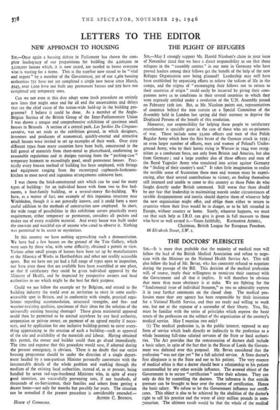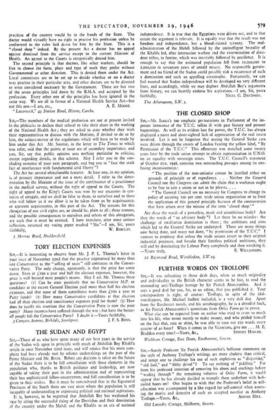THE DOCTORS' PLEBISCITE
SIR,-It is more than probable that the majority of medical men will follow the lead of the British Medical Association and refuse to nego- tiate with the Minister on the National Health Service Act. This will also follow the lead of Mr. Bevan, wits has constanty refused to negotiate during the passage of the Bill. This decision of the medical profession will, of course, imply their willingness to terminate their contract with the Government and all that it implies. It will therefore be obvious that more than mere obstinacy is at stake. We are fighting for the " fundamental issue of individual freeaom," as you so admirably express it in your further comments on the closed shop. The medical pro- fession more than any agency has been responsible by their insistence for a National Health Service, and they are ready and willing to work one, but not at the expense of a surrender of their liberty. You, Sir, must be familiar with the series of principles which express the basic tenets of the profession on the subject of the organisation of the country's medical service. May I mention two only?
(x) The medical profession is, in the public interest, opposed to any form of service which leads directly or indirectly to the profession as a whole becoming full-time salaried servants of the State or local authori- ties. The Act provides that the remuneration of doctors shall include a basic salary, in spite of the fact that in the House of Lords the Govern- ment was defeated over this proposal. Mr. Bevan considered that the profession " was not ripe yet " for a full salaried service. A State doctor's first allegiance is to the State and not to his patient. The very essence of medical ethics is that a doctor should bear a relationship to his patient untrammelled by any other outside influence. The avowed object of the Government is to secure " certification " under their scheme. They can only do this by controlling the doctors. The inference is that outside pressure can be brought to bear over the matter of certification. Hence the basic salary. We refuse to let the Government influence our certifi- cates. This object is also to be achieved by the abolition of the doctor's right to sell his practice and the waste of sixty million pounds in corn. 2.ensation. The ultimate result would be that the whole of the medical
practices of the country would be in the hands of the State. The doctor would virtually have no right to practise his profession unless he conformed to the rules laid down for him by the State. This is a "closed shop " indeed. By the present Act a doctor has no appeal against dismissal from the service except to the current Minister of Health. An appeal to the Courts is categorically denied him.
The second principle is that doctors, like other workers, should be free to choose the form, place and type of work they prefer without Governmental or other direction. This is denied them under the Act. Local committees are to be set up to decide whether or no a doctor may practise in their particular area, and other doctors are to be directed to areas considered necessary by the Government. These are but two of the seven principles laid down by the B.M.A. and accepted by the profession. Every other one of the principles has been ignored in the same way. We are all in favour of a National Health Service Act—but not this one.—I am, etc., A. E. MOORE. " Lavernock," 45 Station Road, Histon, Cambs.



































 Previous page
Previous page